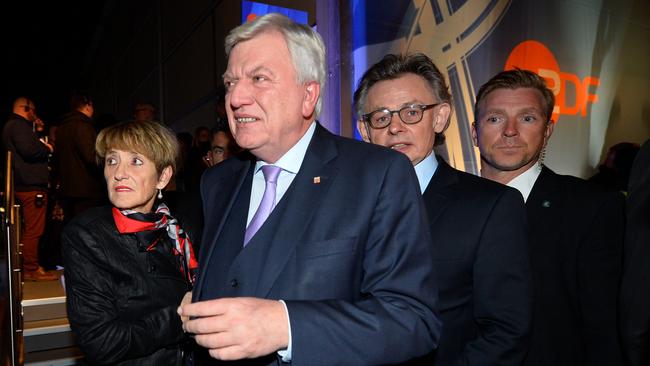Hesse hands out beating to German elite
Angela Merkel’s conservatives emerged with an extremely lacklustre win from the vote overnight Sunday in central Hesse.

Germany’s governing parties have lost support in a state election that was marked by discontent with infighting in Chancellor Angela Merkel’s national government and prompted calls for her coalition to get its act together quickly.
Mrs Merkel’s conservatives emerged with an extremely lacklustre win from the vote overnight Sunday in central Hesse.
Her centre-left governing partners’ dismal performance left them level with the resurgent Greens in second place, while the far-right Alternative for Germany (AfD) entered the last of Germany’s 16 state parliaments.
Mrs Merkel’s Christian Democratic Union was defending its 19-year hold on Hesse, previously a stronghold of the Social Democrats (SPD), the chancellor’s coalition partners in Berlin.
Speculation has been widespread before the vote that a disastrous result for either or both parties could further destabilise the national government, prompting calls for the SPD to walk out and possibly endangering Mrs Merkel’s position.
Yesterday government leaders appeared keen to try to keep the show on the road.
SPD leader Andrea Nahles said that “the state of the government is unacceptable”. She said her party would insist on Mrs Merkel’s governing coalition agreeing on “a clear, binding timetable” for implementing projects, adding that its implementation ahead of an already-agreed midterm review next fall would show “whether we are still in the right place in this government.”
CDU general secretary Annegret Kramp-Karrenbauer said the coalition needs to identify “three concrete projects for the coming months that we implement”. She didn’t specify what they might be.
CDU Premier Volker Bouffier told supporters that “the message this evening to the parties in the government in Berlin is clear: people want less argument, more objectivity, more solutions”.
The CDU won 27 per cent of the vote and the SPD 19.8 per cent. At the last state election in 2013 — on the same day that Mrs Merkel, at the height of her power, won a third term as chancellor — they won 38.3 and 30.7 per cent, respectively. It was the worst result in Hesse for the SPD since World War II.
There were big gains for the Greens, who took 19.8 per cent of the vote, compared with 11.1 per cent five years ago. And the AfD won 13.1 per cent.
The pro-business Free Democrats won 7.5 and the Left Party 6.3 per cent of the vote.
Voters have appeared generally satisfied with Mr Bouffier’s outgoing government. It was the first coalition between the CDU and the Greens to last a full parliamentary term, and an unexpectedly harmonious alliance.
But only the Greens, who are in opposition nationally, benefited at the polls. The result left Mr Bouffier’s CDU-Green coalition with a one-seat majority. A CDU-Social Democrat coalition, or a combination of the Social Democrats, Greens and Free Democrats, would also have a one-seat majority, but neither appears very likely.
The campaign in prosperous Hesse, which includes Germany’s financial centre of Frankfurt, has been largely overshadowed by the woes of a federal coalition in office only since March.
Two weeks ago, both Mrs Merkel’s partners in the coalition of what have traditionally been Germany’s strongest political forces — the Christian Social Union, the Bavaria-only sister to the CDU, and the SPD — were battered in a state election in neighbouring Bavaria.
The SPD, badly beaten in last year’s national election, only reluctantly entered Mr Merkel’s fourth-term government in March. Many are dismayed by what has happened since.
The government has been through two major crises, first over whether to turn back small numbers of migrants at the Austrian border and then over what to do with the head of Germany’s domestic intelligence service after he was accused of downplaying far-right violence against migrants.
Mrs Merkel, chancellor of the past 13 years, has indicated that she will seek another two-year term as CDU leader in December.
AP


